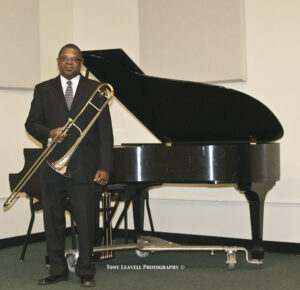
Robert Griffin, director of the FAMU Jazz Ensemble, is a FAMU graduate who even after finding professional success in the music industry, returned to “The Hill” to teach students about the art form of music.
Jazz is one of the cornerstones of Griffin’s life. Growing up, Griffin was surrounded by the classic African-American genre.
“My father was a professional musician. He played [trumpet] in the Army band. When he got out of the Army, he became a band director so I’ve always heard jazz artists like Duke Ellington, Dizzy Gillespie, Count Basie since I was a child. In terms of my becoming a director, I would go to the concerts that [my father’s students] would have and see him conduct the band. [I would also] meet with some of the students that my father would teach after school,” Griffin said.
Griffin continued by saying, “On top of that, my father would regularly have instruments around the house and at his school so I would just experiment and [play all of them]. I started on drums in third grade, then the trombone throughout junior and senior [high school] and then started playing keyboards in college.”
His inclination toward mastering multiple instruments has positively impacted his professional career as a musician and director.
“As a director, you have to know how different things are going to sound together so those years that I was able to experience playing all those different instruments helped me to fully understand what goes into a piece. This helps me understand how to conduct an ensemble to play a piece,” he said.
Griffin’s acute understanding of the instruments, composition, dedication that goes into a jazz song or production as well as his passion for music led to his prolific career as a musician.
“The gift of music has allowed me to travel nationally and internationally. In addition to performing throughout the United Stated, most of the places I have traveled to [internationally] have been the result of performing music. I have played at jazz festivals and concerts in Japan, France, Italy, Ireland and Cuba,” Griffin said.
His dedication to his craft can also be seen in the direction of his students.
“Dr. Griffin is a teacher that will definitely push you. You definitely have to learn how to manage your time because even if things are thrown at you, you are definitely going to have to overcome obstacles,” Marcus Bryant, a freshman music industry student from Tampa, said.
When asked about what jazz is to him, Griffin explained that the genre is a representation of numerous things in the African American community, most notably and importantly unity.
Jazz music is the spirit of unity that we as a community and we as a people need. Jazz music represents so many facets of what we are as human beings. It allows for creativity, self-expression, cooperation, conversation, and so much more. It is the music that represents the suffering and abuse that our ancestors endured upon being brought to America.
“We as African Americans owe it to ourselves to understand the essence of the music, and it was created by, for and about the lives of those who were oppressed the most. The irony is that the music that represents the true ideals of American democracy and freedom was created by those who were the most oppressed,” Griffin said.
Mitchell Charles-Lewis, a senior mechanical engineering student from Orlando and a baritone saxophonist in the FAMU Jazz Ensemble, shared similar thoughts.
“Jazz music is the original African American art form. [It was] the first thing we created when we got here and it stays alive in all the music we have today,” he said.
Griffin also believes that the spirit of jazz can be seen in today’s music.
“Jazz music can be seen from samples to cadences or references in [popular music] like rap. Jazz music reflects the changes in society and culture, which is why there are so many styles of jazz like traditional, bebop, fusion, swing, etc. All of those styles came about because the audience and artists evolved. The times also evolved. As our society and culture changes, so will the music. The good news is that any changes in the style of the music will be in addition to what has already been established. Previous styles [of music] do not die away when a new style is added,” he said.
“A Night in Birdland,” an upcoming event that will feature the FAMU Jazz Ensemble and the FAMU Essential Theatre, will showcase jazz in an immersive experience that will bring the world famous Birdland jazz club in New York to FAMU’s campus.
Bryant described the concert as “a very diverse concert that we want to put as much soul and jazz from the ’70s and the late 1900s as possible into this show. And I think we’re putting as much of our talent, as much of our parts that we can make happen into the concert. We’re trying to make it the best concert we’ve had all year.”
With Griffin and the FAMU Jazz Ensemble providing the soundtrack for a production that will bring the club atmosphere to life, “A Night at Birdland” is a great place to see the magic and soul of jazz while providing a great closeout to Black History Month.
“A Night in Birdland” will take place at 7:30 p.m. Friday in the Foster-Tanner Band Hall. General admission tickets are available for $10 and student tickets (with proper FAMU ID) are available for $5 at my.famu.edu/event/birdland. The link to purchase tickets can also be found on the FAMU Jazz Band Instagram page @famu_jazz.